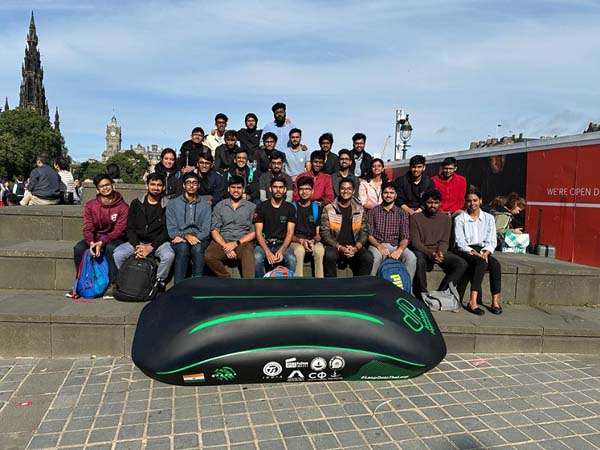
Just over a decade after electric car entrepreneur and ‘X’ (formerly Twitter) owner Elon Musk first mooted a daring new way to move people across land at speeds over 600 kmph, in semi-vacuum tubes, that dream has crashed for the company he founded: Hyperloop One.
The San Jose (CA) Mercury News has reported last month, citing Bloomberg, that almost all its 200-plus employees have been laid off, its Las Vegas test track sold off and its technology and intellectual property likely transferred to principal shareholder and Dubai-based conglomerate, DP World.
India, at one time saw at least three MOUs signed with the parent US developer to set up Hyperloop links between places like Bengaluru airport, its city centre and Mysuru in Karnataka; Mumbai and Pune, in Maharashtra and between Amaravathi and Vijayawada in Andhra Pradesh.
And this week, it seemed to be business as usual for a handful of startups which have started Hyperloop projects of their own in recent years.
Hyperloop One’s basic idea of land transportation at near aircraft speeds has regularly attracted world headlines since 2014 – and US$ 450 million in investments from entities including Virgin Airlines’ Richard Branson. For a few years it was rebranded Virgin Hyperloop till Branson pulled his stake out and DP World stepped in.

Power electronics engineer Tanay Manjrekar. was among the very few to have test-ridden a hyperloop vehicle: Photo Virgin Hyperloop
At one time a few professionals from India worked for Hyperloop: they included Pune-origin power electronics engineer Tanay Manjrekar, who had the distinction of being one of the first two humans to ride the test track in a Hyperloop pod albeit at a scaled-down speed of 175 kmph.
But the years lost to Covid took their toll on Hyperloop and in March 2022, a surprise announcement said the project was being repurposed for transporting goods rather than people. This dampened much of the enthusiasm world-wide. People being able to journey from Pune to Mumbai in 25 minutes instead of 3 hours or between San Francisco to Los Angeles in California, cutting down the 6 hour drive to 35 minutes, had an attraction for motorists. But who needed to move goods that fast?
It was mostly downhill for the project in the US after, that till last month’s final closure.
Indian efforts
As far as one can tell, startups centred mostly around Pune and Chennai who are at various stages of putting scaled-down Hyperloop pods through their paces, are not giving up.
In Chennai, two teams mentored at IIT Madras, have been regularly meeting their milestones. Since 2017, the 50-member Team Avishkar has received funding from the Indian government, L&T and Tube Investments of India and an expression of interest from the Railways and has been pushing for a 350 km track between Chennai and Bengaluru that could reduce travel timeto 30 minutes.
The IIT-Madras-incubated startup, TuTr, hopes to carry forward the research of Team Avishkar and commercialize it. PTI reported, that the company has partnered with Tata Steel and Arcelor Mittal to put up a 400-metre test track in Chennai. Last year it signed an agreement with a Netherlands-based Hyperloop player, Hardt Hyperloop, for some joint development. TuTr’s initial focus will be on transporting cargo – always a safer option to try.
Cargo is also the priority of Pune startup Quintrans which has been working since 2021. The company grew out of a 40-student project at MIT World Peace University called VegaPod. Having raised over USD 100,000, in investments, Quintrans appears to be reasonably well funded – for now.
Hyperloop gatherings of the faithful continue to be held worldwide. At the European Hyperloop Week 2023 in Zurich, Switzerland, all Indian projects were represented and some like Team Avishkar were judged among the top 3 entries. EHW 2024 takes place in July this year and is expected to see Indian participation again.
Now that the original Hyperloop in the US has been abandoned, will a domino effect erase these Indian efforts or will they rise Phoenix-like with viable systems, out of the ashes of Hyperloop One?
Too early to tell – but without a strong anchor customer like government, it looks to be a formidable task. At one time the government-run railways showed interest, but Dr V.K Saraswat, the member in the Indian government think tank, NITI Aayog, in charge of exploring the potential of Hyperloop, was quoted by PTI two months ago ruling out any serious near-term interest in the technology as an ultra-high-speed train option.
No other big corporate or government interest is visible –though state governments like Maharashtra and Andhra Pradesh might still keep their original plans open. But realistically, the Indian efforts are still nowhere close to workable prototypes – and even with an optimistic and upbeat government at the helm, a hyperloop transport – for people or goods -- wearing the Indian tricolour looks like something of a dream today. But 10 years hence? Who knows!
This has appeared in NewIndiaAbroad